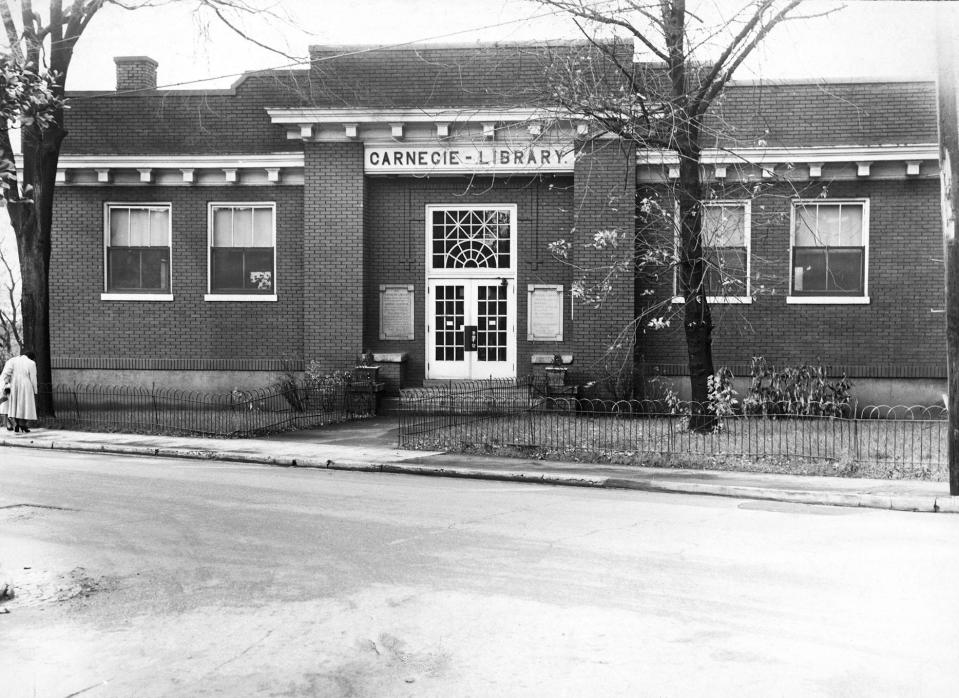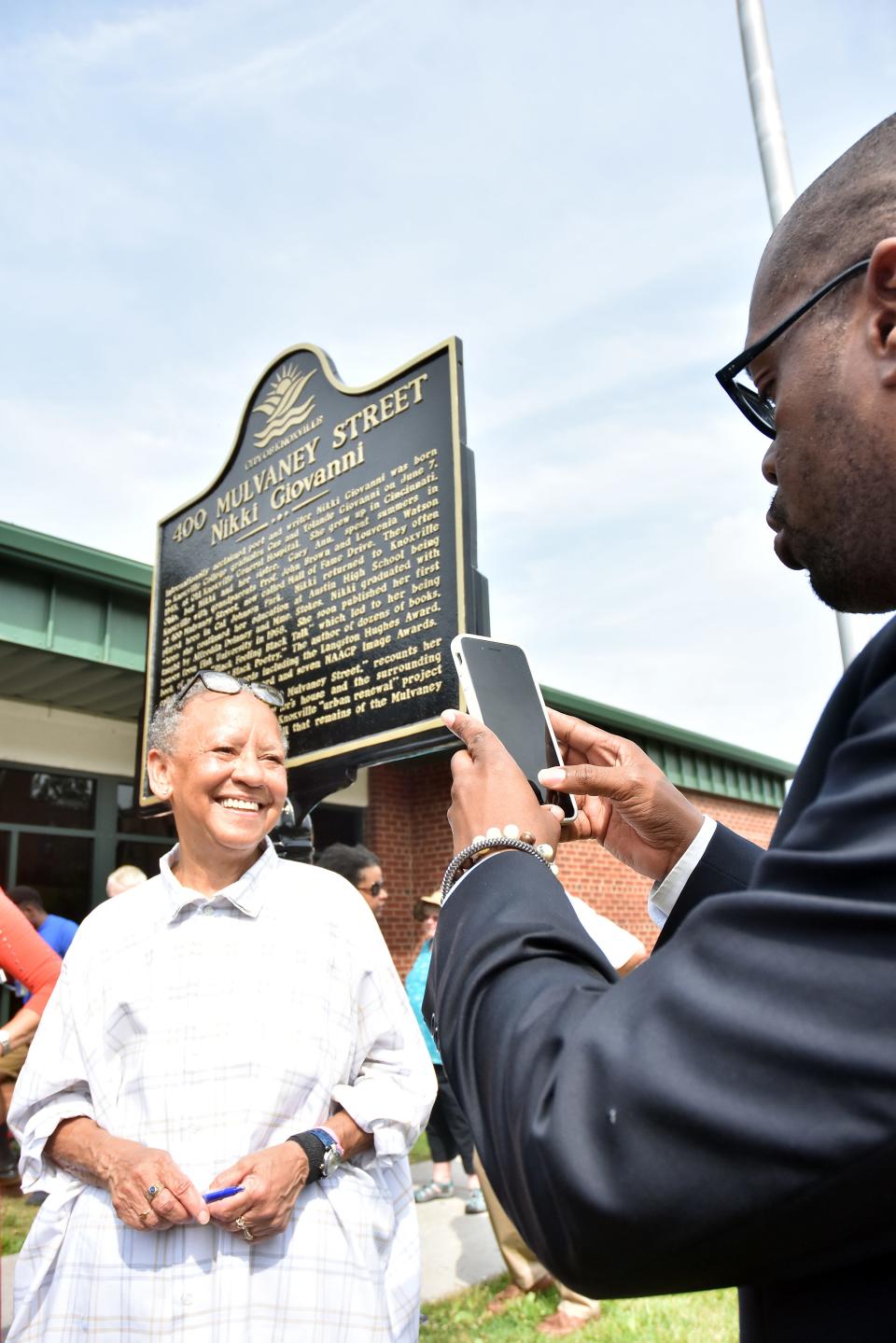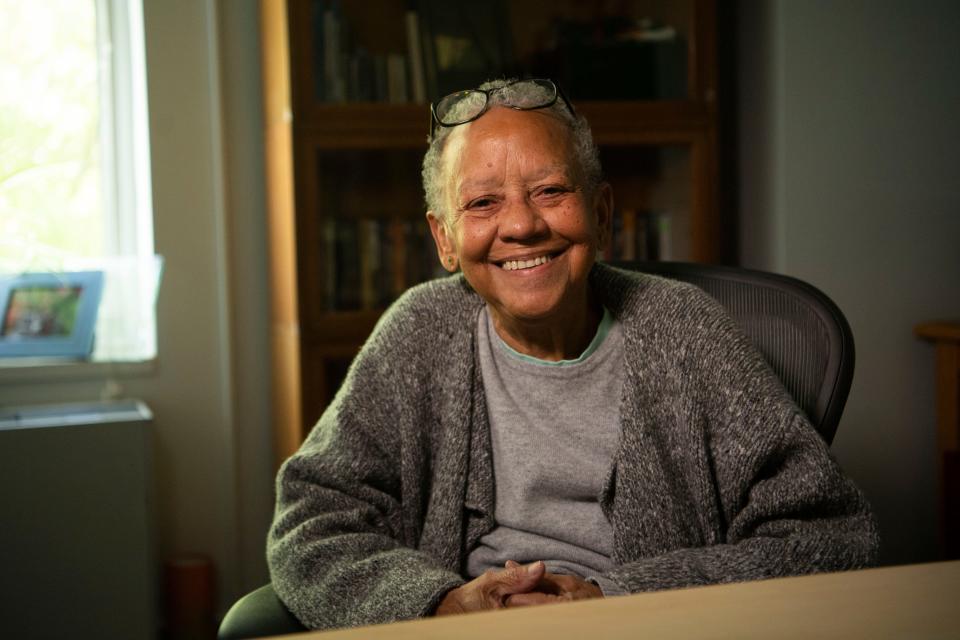'Because I just love it': Nikki Giovanni celebrates 80 years with Knoxville on her heart
- Oops!Something went wrong.Please try again later.
Woven into her delicate memories of the iconic James Baldwin, whom she affectionately refers to as “Jimmy,” her beloved friendship with the revolutionary Nina Simone and a fondness for Fannie Lou Hamer, Nikki Giovanni also remembers summer Sunday mornings in Knoxville. It's what she calls a tiny little town that she just happens to care a lot about.
The legendary poet is no stranger to the city or those who dwell here. Her former address at 400 Mulvaney St. was wiped out with urban removal but kept alive through her literary work and memories.
Knoxville not only shaped her legacy, it influenced her artistry.
In 1958, Giovanni moved from Cincinnati back to her birthplace of Knoxville to live with her grandparents on the street that she looks back on with a childlike wonder.
It was in the racially segregated little Carnegie Library in East Knoxville that her literary genius was conceived. But after urban removal decimated it and economically oppressed African Americans in the city for decades, failing to shock the conscience of leaders until recent years, many have left and never returned to the city.
They come and go, and they don't look back. But Giovanni after all these years keeps the scruffy little city on her mind, never forgetting her Appalachian roots.
And with another book left in her to write just a couple decades shy of living a century on earth, her mind is yet again on Knoxville.
In an exclusive face-to-face interview in honor of her 80th birthday with Knox News near her home in Blacksburg, Virginia, Giovanni reflected on her life’s legacy, her childhood memories, and what the current social and political landscape means for the future of her beloved Knoxville.

Fondest memories lie at the heart of a hill on Dandridge Avenue
In her 2022 children’s book, "A Library," she describes the Carnegie Library not merely as a place to return books but a place to be free. It’s her sacred love letter to librarians who provide a home away from home for all who enter.
It clearly still tugs at her heartstrings. It was a simple building but it birthed her passion for writing.
“My favorite place, of course after grandmother’s house, was the library. It sat right at the top of Mulvaney. We went to the Carnegie Library every Sunday after church at Mt. Zion Baptist up on the hill. Those were wonderful memories. The Lawson McGhee Library was the white library uptown. So this was ours. Before they came and destroyed everything, of course. There was the Gem Theatre we went to and the drug store, we really had a community, but then they came in and said no we need it and it changed everything."
She also hasn’t forgotten the original Mulvaney Street historical marker they knocked down.
“They told me that a truck accidentally knocked it down and it’s one of those things where you just laugh and say, "Oh please,'" Giovanni chuckled.
“The city finally did commit to preserving Cal Johnson Park and making it better, then they put the plaque back up. So I was pleased about that. But it wasn’t just about me when the city did that, it wasn’t just about oh Nikki got a plaque up, and I am glad because grandmama and granddaddy would be happy about that, but it was more of a question of recognizing that once there was a street called Mulvaney, and that brings tears to my eyes.”
And there were those circus trips she hated but her grandmother loved, so she tagged along.
“I was thinking about that the other day. My grandmother loved the circuses. I don't like them, and I don't like movies. I would do anything to not have to go to a movie theater. I think the last one I went to see was 'The Godfather,'" she laughed. "When the circus came to Knoxville nobody would go with grandmama ‒ grandaddy didn't like them either so she would say, 'Nikki come go to the circus with me,' and you couldn’t tell her no. She was always delighted, like she was 12 years old all over again. I enjoyed seeing her happy.
"Between that and cooking together those are some of the memories of Knoxville I hold on to.”
Baseball stadium and revitalization a reminder of Mulvaney: 'Black Knoxville has to fight back’
Nothing looks the same in Knoxville as it did back when Giovanni started living with her grandmother Louvenia, and her grandfather, John Brown Watson, who was a Latin teacher at Austin High. But she can remember all of the summers in the city because there was a strong sense of Black solidarity, or "community" as she calls it.

When James White Parkway broke up cohesive neighborhoods, forming a barrier between downtown and the African American neighborhoods that once stood stronger than they do today, she remembers the pain and heartbreak. Something was stolen that she can’t get back, not even with promises of reparations or resolutions.
And like Giovanni, many Black Knoxvillians today feel that same apprehension as they watch new developments on the east side. The neighborhood formerly known as The Bottom is now going to be the home of a bright, shiny new baseball stadium. To some, the project holds the hope of economic growth and potential. To others, it’s gift-wrapped in empty promises. Giovanni hasn’t lived in the city in recent years, but she knows enough about what’s going on to tell its Black residents to pay attention.
“I remember what it was like back then. There wasn’t all the gun violence that I’m quite sad about. We had a community. And when it was gone that was a very unhappy time because Grandmama and Grandpapa lived at 400 Mulvaney and you see what happened to it. I’ve said before that this happens in cities all over the country. They push Black people into what they call a bad part of town and once we make a community out of it, they decide they want it or they put a highway through it. In this case, I would hope and I would want the community to fight back. And one of the ways you do that, and there's a lot of ways you do that, but one of the legal ways is to vote. We have Gloria Johnson and the young men that they tried to get rid of. They aren’t taking any crap from anyone. I'm glad they are there."
"During my time we had those like Avon Rollins who fought. We need leaders like that in Knoxville who are going to say we aren’t going to let you come in here and just do what you want to do or take what you want to take. You’ve got to fight back.”
Why Knoxville stays on her mind in latest book
There are a lot of things Giovanni could write about at her age, after all she did live through Jim Crow and segregation, the Civil Rights era, consequential presidential elections, and spent time with some of the world’s most influential people. But she continues to write about Knoxville, for no particular reason except for the fact that it’s home.
She wrote about Knoxville in 1968 with her poem "Knoxville, Tennessee," in a few books in between, and in her latest work entitled "A Street Called Mulvaney," set to be released in 2024.
“I write about Knoxville a lot because I want to share the love I found there. It’s the place I first found community. It’s where I learned to love church, and made friends.”
These days she doesn't visit as often, but when she comes to town, the Beck Cultural Exchange Center, the city’s hub for Black history, is always at the top of her list.

She hopes the stories she has shared about the city will inspire others to hold on to their memories of those who came before them and think about their sense of belonging.
“I don't think I am the only one who remembers places like where our grandparents grew up and their stories. I am hoping that people will look at my story and say, 'Oh, well I remember my grandmother lived here or I remember where we were. And some of these stories are about just little old houses like my grandparents' and smaller places, and some of these are really grand houses. But I think it's just about sharing a story, sharing your story. Knoxville on a Street Called Mulvaney just happens to be mine.”
Angela Dennis is the Knox News social justice, race and equity reporter. Email angela.dennis@knoxnews.com. Twitter @AngeladWrites. Instagram @angeladenniswrites. Facebook at facebook.com/AngelaDennisWrites
This article originally appeared on Knoxville News Sentinel: Nikki Giovanni pays tribute to Knoxville, Tennessee, as part of legacy

